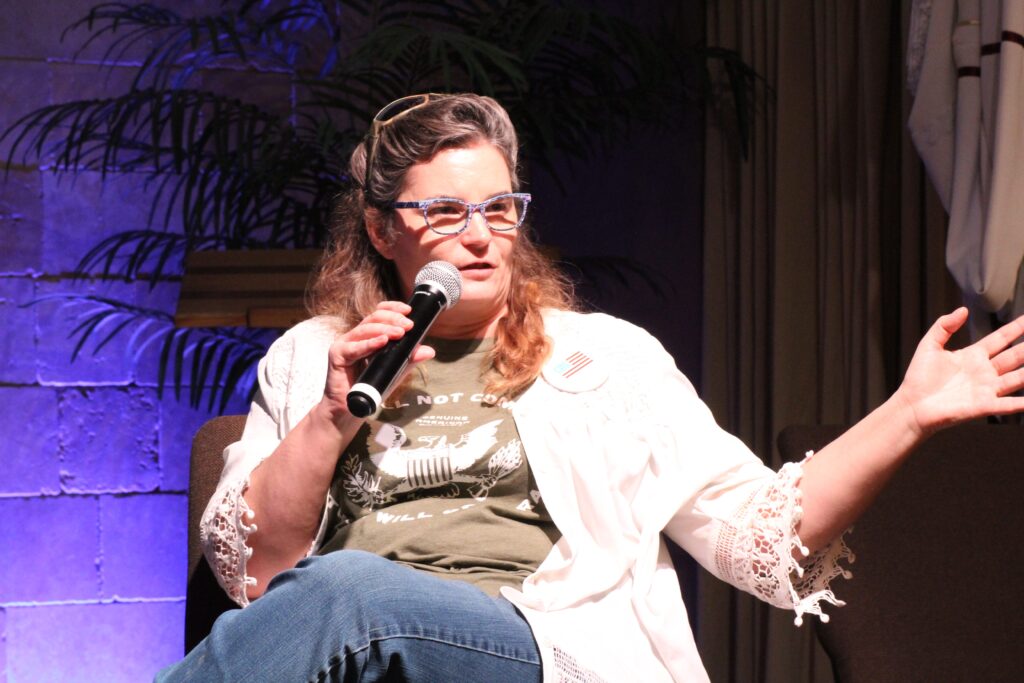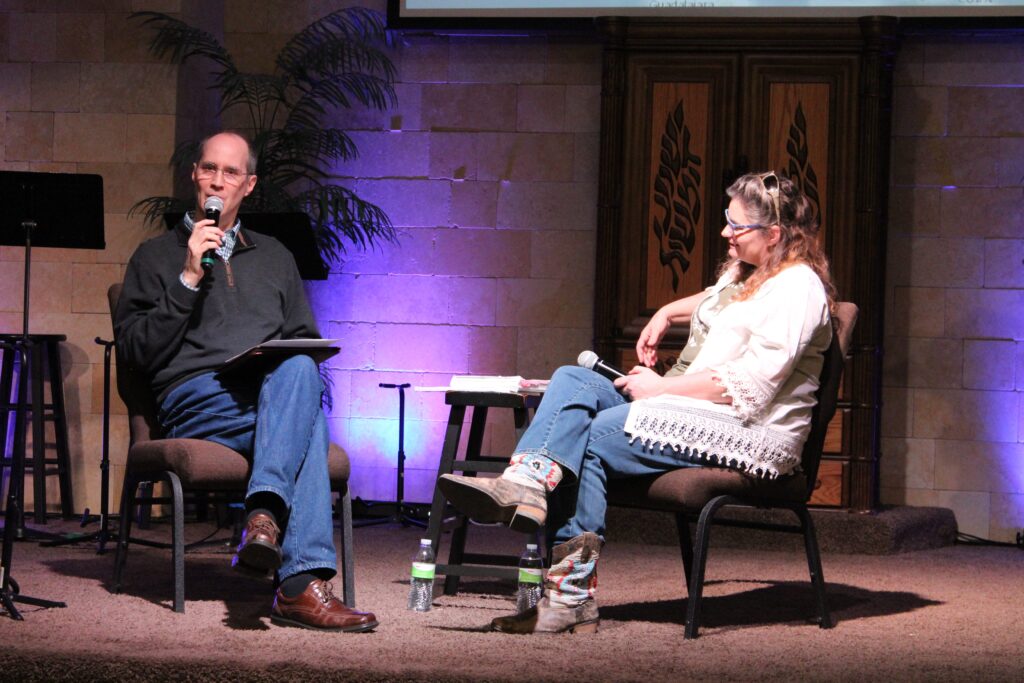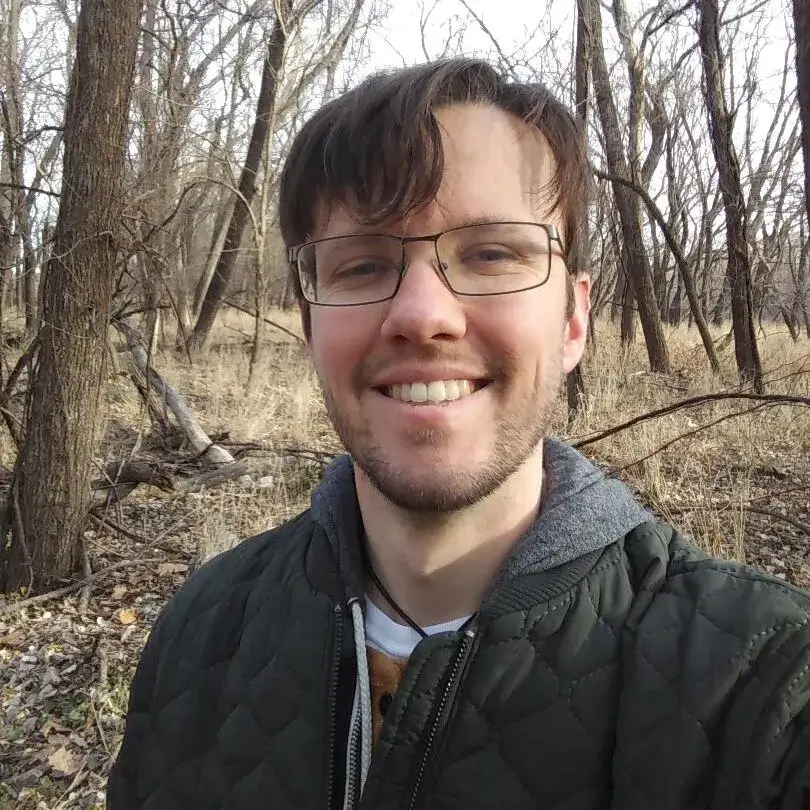Angel Cushing speaks about 30x30 at Convention of States Town Hall meeting

More than 50 people gathered at Or Haolam Messianic Synagogue, 9898 W 95th St, Overland Park, KS where they were able to learn about the 30 by 30 land grab from speaker Angel Cushing, who is also a Convention of States (COS) activist. The event started at 6:30 p.m. on Wednesday with a welcome from Regional Captain for COS Kansas John Stepnoski. A table with information on COS was put up for anyone interested in learning more about the issue. Another table had information on 30 by 30.
The Pledge of Allegiance was said which was followed by a prayer by Rabbi Shmuel Wolkenfeld before COS Legislative Liaison for Kansas Ben Terrill and Cushing spoke to the crowd in an interview-like fashion with Terrill asking the questions.

Terrill started the conversation providing some background behind the town hall conversation.
“Over here in the United States, we are a little over three years into President Biden’s Executive Order 14008,” Terrill said. “This was signed a little over three years ago and includes the statement, ‘Achieve the goal of conserving 30 percent of our lands and water by 2030.’ From this order comes the phrase, ‘30 by 30’ for 30 percent by 2030.”
Terrill read part of the order which details how this is to be accomplished.
“The order establishes the National Climate Task Force assembling leaders from across 21 federal agencies and departments to enable a whole of government approach to combatting the climate crisis.”
Cushing called the Executive Order a “confession by an administration for the very first time of coveting land that they have been doing for at least 70 years.”
Cushing said that 30 by 30 is the “rebranding of Buffalo Commons.”
“Buffalo Commons is an idea to turn the entire plain states between the two mountain ranges back over to wilderness for buffalo,” Cushing explained. “But if you look at the economic plans, they think that this is needed but they need to add to it… tourism and energy production.”
Cushing also stated that the global plan will be to import all food from Africa with the goal being to colonize Africa.
She showed maps of U.S. land already under conservation, noting that when you combine all three maps, we are already over 30 percent conservated land. All three maps can be found at the following links:
Cushing explained how conservation easements depopulate the area and stop growth.
“Once you freeze that land into preservation and lack of development, then technology and farming moves,” Cushing said. “Those young people that are keeping up with technology, they’re going to go where they’re allowed to use that technology. So, it depopulates the area. And once the area is depopulated enough through various mechanisms, they donate that or sell that to the federal government.”
Terrill and Cushing noted that overtime new restrictions would be implemented before Cushing began explaining ‘form-based zoning.’
“Form-based zoning takes all the zoning we know today and it makes it vague,” Cushing stated. “Allowed for interpretation by an employee, not by an elected official. Then, it flips the burden of proof onto the property owner. So you have to prove that you should be able to or not be able to. And that zoning administrator can not only make that decision, but also gets to decide whether or not you have the right to protest to your county commissioners.”
She went onto say that she discovered that her county tried to join a National Heritage Area (NHA) called Freedom’s Frontier National Heritage Area which was created by the federal government in 2006 and has 29 Kansas counties and 12 Missouri counties already. It is also one of 62 NHAs in the U.S.
Cushing said they lie to Congress like they lie to the people affected—telling Congress that the people want the NHA. Cushing urged anyone who owns property to send letters to Congress stating they do not support what the NHA is for.
“If you talk to the NHA, what they’ll tell you is that they’re all about tourism,” Cushing said. “What they really are is a special interest group raking in federal dollars for their federal interest groups. What they won’t tell you is that they have a national park service guided land management plan for the entire area.”
She explained that what they are doing on these lands that are already owned by the government is slowly closing access to the public, but must fill the need for recreation to the population to appease the population.
They also noted that by law, every NHA is supposed to be self-sustaining within 15 years, however, all 62 are not self-sustaining yet. The first NHA—The Illinois and Michigan Canal NHA—was designated 40 years ago in 1984.
“They go back to Congress and they cry for renewal,” Cushing said. “Freedom’s Frontier just got renewed along with all the others in the nation until the year 2035.”
According to Cushing, the goal of the NHAs is to become national parks—three of which have made that status.
“Depending on what the political climate is in that area… and congressional funding depends on how quickly they can move into a national park service,” Cushing said.
The topic moved to Cargill—one of the largest traders of cattle in the nation. Cushing spoke on how she went to Cargill in Wichita for a U.S. Global Leadership Coalition, and described it as an “infomercial for the World Economic Forum.”
“In there were policymakers,” Cushing said. “Gov. Kelly was there. State Representatives. Congressman Jake LaTurner (R-KS02) was there…. The guy who runs Shop Kansas Farms. Ag Department… they were all there. On that stage they were talking about how we were killing our soils here so therefore we need to reduce agriculture.”
She noted that many of these leaders are “anti-animal,” believing people should not have pets or touch animals. Terrill asked Cushing what they are to do with animals then, asking if we are just to leave them alone.
“Or kill it,” Cushing stated. “Their idea is that it’s better to have no cows at all than one in captivity.”
Cushing went onto say that Cargill doesn’t care that they’re not going to sell you cow, but rather, they care that your only choice is to buy from them, whether that’s fake meat or bugs.
Cushing did give people hope, stating that once they started telling people about what was going on, a NHA that was trying to expand into Kansas backed off.
“One person, simply informing people, can take this on and can fight this back.” Cushing said.
She then went into her bill SB 370, which is currently in the Senate Committee on Federal and State Affairs. The bill asks for the State Legislatures to vote on a NHA or trail before it goes in. Should the vote fail, all state funding will be denied. The bill was written by looking at similar bills passed by Montana and North Dakota and adding things that the states say they wish they would have added to the language of their bills. Since those bills were adopted in those states, no new NHAs or national trail has been introduced in those states.
“Remember, they lie to Congress and tell Congress the people want it,” Cushing said. “If you have a State Legislature who voted ‘no,’ that makes that lie a lot harder to sell.”
Terrill noted it also creates transparency, and Cushing agreed.
“If you look at all the Counties involved in Freedom’s Frontier which was started in Douglas County in Lawrence. This would make them project more realistically. Instead of a great, big, huge boundary, it might be around a historical district or a city. That is a lot more manageable and not near as threatening… It makes it more transparent. It makes it more realistic. Not quite so partner-ish and favor-ish to the federal government.”
Terrill stated that what he really liked about the bill is it would seek to restore “consent of the governed.” He then read the first paragraph of the bill, which reads:
“AN ACT concerning national land designations; requiring legislative approval of any designation of a national heritage area or national historic trail in the state of Kansas or the inclusion of certain property within any such designation; prohibiting state funding of any national heritage area or national historic trail unless such funding is first approved by the legislature of the state of Kansas.”
Cushing then noted that funding for NHAs requires 50 percent natural funds, meaning they are required to raise 50 percent of the funds before they get a matching grant from the federal government. This means they will be forced to go to the community to raise their funds.
“So, they won’t be able to do 26 counties in that case,” Cushing said. “They’re going to have to be a lot more realistic if they want to do this type of a program. Everybody says this will get rid of NHAs and trails. No. This will force them to be more realistic and require community involvement and maybe require consent.”
Once Terrill and Cushing were finished speaking, the audience was able to ask questions for clarifications and deeper understanding of the topic at hand.
Thanks for reading. Be sure to share and subscribe. You can also help support independent journalism in Kansas by buying me a coffee at buymeacoffee.com/kscon.

Ian Brannan
Ian Brannan is an independent journalist who founded The Kansas Constitutional in April 2022. His work focuses on issues including abortion, Convention of States, drug policy, education, government, LGBT issues, media, and more.
